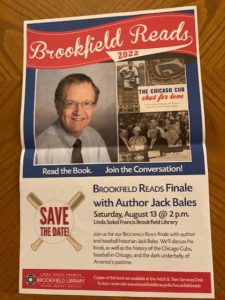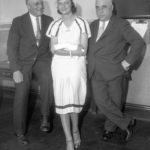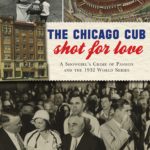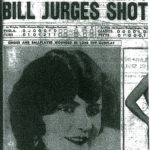
Reference and Humanities Librarian Emeritus Jack Bales
Jack Bales’ vocation for more than 40 years was assisting students, faculty, and staff in Mary Washington’s library. His avocation, research and writing, was always an important part of his life as well, and now that he’s retired, the Reference and Humanities Librarian Emeritus happily stays busy with these interests. Bales continues to present Zoom PowerPoint programs to baseball groups and public libraries around the country on his true-crime narrative and tale of baseball history, The Chicago Cub Shot for Love: A Showgirl’s Crime of Passion and the 1932 World Series (History Press, 2021). He is an active member of the Society for American Baseball Research (SABR), and has presented several Zoom programs on assorted baseball topics. He is also an occasional moderator of a SABR book discussion group devoted to the sport during the nineteenth century.
Bales has always liked to focus on topics about which little has been written, as he enjoys digging around in primary, original sources and uncovering new information that sheds light on the historical record. While working on his 2019 book, Before They Were the Cubs: The Early Years of Chicago’s First Professional Baseball Team, he read about Lewis Meacham, a Chicago Daily Tribune sports editor who helped William Hulbert of the White Stockings (the team now known as the Chicago Cubs) found the National League in 1876. Very little was known about Meacham, but Bales tracked down invaluable material in both newspapers and Chicago and Vermont archives. He gave a PowerPoint presentation, “The Mysterious Lewis Meacham: The Untold Story of William Hulbert’s Right-Hand Man,” at a SABR meeting and also wrote an essay on him for the organization’s peer-reviewed Biography Project, https://sabr.org/bioproj/person/lewis-meacham/
Bales said that it took many months of research, as most of what was published was inaccurate, including a fictitious Civil War record. “You know you are going to have a rough time of it,” he recently observed, “when biographical sources for the person you are writing about provide assorted birth dates, various names, two birth places, two burial spots, and even two entries in the popular website “Find a Grave,” both of them incorrect.”
Bales hosted the annual convention of the Horatio Alger Society in Fredericksburg in 2021, 2022, and 2023. He will host it again this May. Among the persons attending will be Michael Dirda, the weekly book columnist for the Washington Post.






